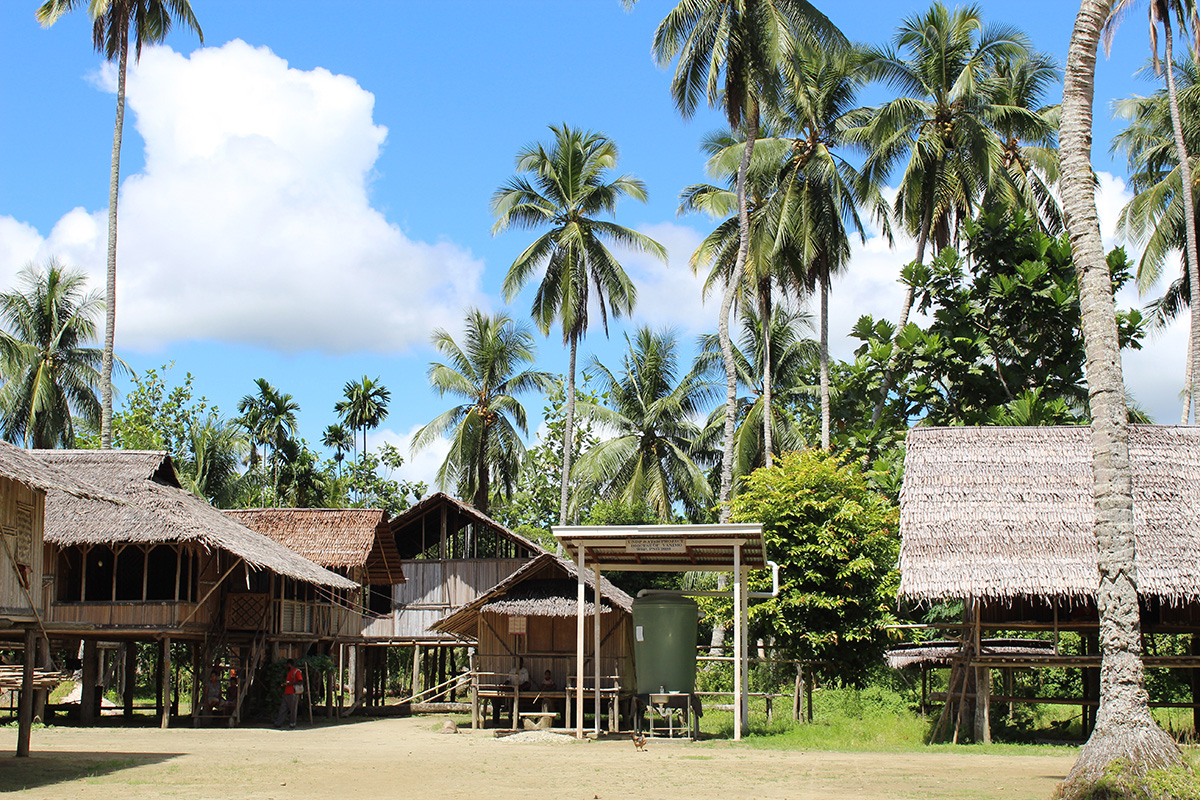Women in Moi, using their traditional fishing nets to catch fish along Idam River, West Sepik Province. Photo: UNDP Papua New Guinea | Michael Sembenombo
Reaching the hinterlands of Vanimo-Green River District in West Sepik Province is a journey not for the faint of heart.
The further you get from Vanimo Town, the capital of West Sepik Province, it feels like traveling back in time. At a certain point, the network connection will be lost and mobile phones become useless. Your phone will be substituted for a VHF 2-way radio system before the powerlines fade into the background and the FM band of the radio stops. Once you reach the end of the road network, the only way forward is by foot or dugout canoes along tributaries feeding into the mighty Sepik River.
Monitoring and Evaluation Analyst, Mr Michael Sembenombo, recently visited 10 villages in the Moi and Kasai area. His mission was to evaluate 10 water supply projects, supported by UNDP through its humanitarian coordination component, under the ‘Strengthening Disaster Risk Management in Papua New Guinea Project’ and the Australian Government's Department of Foreign Affairs and Trade (DFAT).
Women queue to fetch clean drinking water from a newly installed water tank at Wapfai, Green River District in West Sepik Province. Photo: UNDP Papua New Guinea | Michael Sembenombo. |
The UNDP team traveled in dugout canoes on the Moi, Idam and Yapsi rivers, tributaries of the Sepik River, to reach most of these remote communities that are situated close to the border between Papua New Guinea and Indonesia.
Caritas Papua New Guinea, in partnership with the Catholic Dioceses of Vanimo, was contracted to implement the Water, Sanitation and Hygiene (WASH) Project. The project had three components: the installation of a water catchment system, hygiene and sanitation, and Covid-19 awareness.
Mr Sembenombo said that for most of these communities, it was the first time in a long time they had access to clean water.
At Wapfai Village in the Moi area, Mrs Selina Wana and Mrs Sarah Eugene expressed their gratitude for the water catchment system. They now have close access to clean water.
“We used to access water for drinking, cooking and doing laundry from the Idam River. We don’t have any other options nearby when the Idam is flooded. The next source of water is very far away, toward the mountains,” said Mrs Wana.
For these remote communities having access to clean water has contributed to a decrease in waterborne diseases such as diarrhea, abscesses and rashes.
“Our children used to bathe and drink from the river and that has made them sick. We take them to the small health post here at Moi, but many times there is no medicine or nurse. We then travel eight hours to get to the Green River Health Centre. Now we are seeing changes with the installation of this water tank, especially for us women and children. Having access to clean water will help us and our children very much,” she said.
New water catchment systems, which include a 2000L water tank, hand washing basin and a shelter for rainwater harvesting, were installed in Bisiabru, Bariot and Wapfai and two tanks at Moi Parish. Similar water catchment systems were installed in Warabuka, Kasai Primary School and in Kasai Parish where a shelter and hand-washing basin was erected next to a 9000L water tank donated by Community Development Scheme (CDS) in 2010. The parish tank had been idle for nine years until support from UNDP and the Australian Government arrived through Caritas Papua New Guinea and Vanimo Catholic Diocese.
A Water Catchment System set up at Wapfai Village, Moi Parish, Ward 13 of Green River District. Photo: UNDP Papua New Guinea | Michael Sembenombo |
The only community yet to have a system installed is Koima Village, a full day's travel up the Yapsi River.
Fr Moses, from the Order of the Little Way Missionaries of Saint Therese of Child Jesus, said he is appreciative of UNDP’s support through Caritas Papua New Guinea and the Catholic Diocese of Vanimo for the provision of this essential resource.
"Enabling people to have access to clean drinking water makes me happy. Water is one of the basic needs of all human beings, including plants and animals. I have been working with my team to install all the water catchment systems in Moi and Kasai,” said Fr Moses, explaining it was a community effort involving both men and women in each village.
Parish priest of Kasai, Fr Moses, tests the tap in one of the installed water tanks at Kasai. Photo: UNDP Papua New Guinea | Michael Sembenombo. |
"Women collected gravel, fetched water for mixing cement and cooked food to feed the men while men constructed the shelters, built tank stands and hand-washing basins, set up water tanks and gutters," he said. "This showed that the community really wanted this project."

 Locations
Locations







